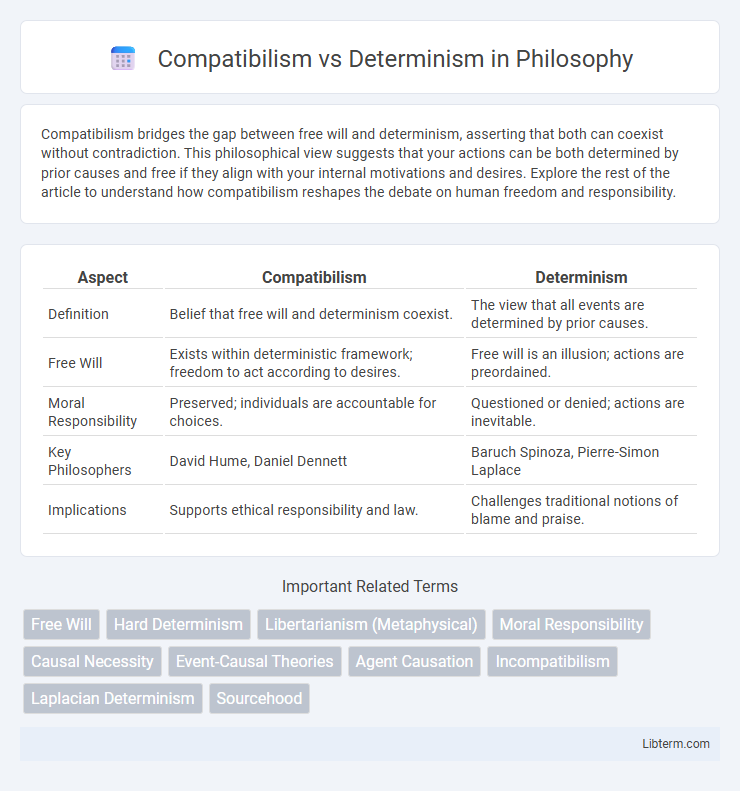Compatibilism bridges the gap between free will and determinism, asserting that both can coexist without contradiction. This philosophical view suggests that your actions can be both determined by prior causes and free if they align with your internal motivations and desires. Explore the rest of the article to understand how compatibilism reshapes the debate on human freedom and responsibility.
Table of Comparison
| Aspect | Compatibilism | Determinism |
|---|---|---|
| Definition | Belief that free will and determinism coexist. | The view that all events are determined by prior causes. |
| Free Will | Exists within deterministic framework; freedom to act according to desires. | Free will is an illusion; actions are preordained. |
| Moral Responsibility | Preserved; individuals are accountable for choices. | Questioned or denied; actions are inevitable. |
| Key Philosophers | David Hume, Daniel Dennett | Baruch Spinoza, Pierre-Simon Laplace |
| Implications | Supports ethical responsibility and law. | Challenges traditional notions of blame and praise. |
Introduction to Compatibilism and Determinism
Compatibilism asserts that free will and determinism are compatible, proposing that individuals can make meaningful choices even in a causally determined universe. Determinism posits that every event or state, including human decisions, is the inevitable result of preceding causes. The philosophical debate centers on whether determinism negates genuine freedom or if compatibilism successfully reconciles the two concepts.
Defining Compatibilism: Core Concepts
Compatibilism defines free will as the ability to act according to one's desires and intentions without external coercion, even within a deterministic framework. It reconciles human freedom with causal determinism by emphasizing internal motivations rather than the absence of causation. Core concepts include moral responsibility, voluntary action, and the alignment of choices with personal values despite predetermined conditions.
Understanding Determinism: Philosophical Foundations
Determinism posits that every event and decision is the inevitable result of preceding causes, grounded in the principle of causality and natural laws. Philosophical foundations trace back to thinkers like Aristotle and Laplace, emphasizing a universe operating under fixed laws without randomness. This framework challenges notions of free will by suggesting human actions are predetermined by prior states and external factors.
Historical Perspectives on Free Will
Historical perspectives on free will highlight the evolution of compatibilism and determinism debates, beginning with ancient philosophers like Aristotle, who emphasized moral responsibility within a deterministic framework. Stoic philosophers further developed determinism, asserting that fate governs all events while advocating for internal freedom through acceptance. In the Enlightenment era, thinkers such as David Hume advanced compatibilism by reconciling free will with causal necessity, arguing that freedom is the ability to act according to one's desires even if those desires are determined.
Key Arguments for Compatibilism
Compatibilism argues that free will and determinism are compatible because free will is defined as acting according to one's desires and intentions without external coercion, even if those desires are determined by prior causes. It emphasizes the importance of moral responsibility, asserting that individuals can be held accountable for their actions if they act voluntarily and with self-control. This view challenges the incompatibilist position by redefining freedom to fit within a deterministic framework rather than rejecting determinism outright.
Central Claims of Determinism
Determinism asserts that every event, including human actions, is causally determined by preceding events and natural laws, eliminating genuine free will. It holds that given the state of the universe at a particular time, only one future is possible according to fixed causal chains. This central claim contrasts with compatibilism, which argues that free will can coexist with determinism by redefining freedom in terms of internal motivations rather than metaphysical freedom.
Compatibilism vs. Determinism: Main Differences
Compatibilism argues that free will and determinism are compatible, asserting that individuals can make meaningful choices even in a determined universe. Determinism holds that all events, including human actions, are causally determined by prior states, leaving no room for true free will. The main difference lies in compatibilism's redefinition of free will to fit within deterministic frameworks, whereas determinism denies the existence of free agency altogether.
Criticisms and Counterarguments
Compatibilism faces criticism for allegedly redefining free will to fit deterministic frameworks, which some argue undermines genuine autonomy by allowing actions to be predetermined yet still deemed "free." Determinism counters that all events, including human choices, follow causal laws, challenging the validity of moral responsibility as compatibilists attempt to preserve it. Critics of determinism argue it negates personal accountability, while compatibilists assert that freedom can coexist with causal necessity if actions align with internal motivations rather than external coercion.
Compatibilism and Moral Responsibility
Compatibilism asserts that free will and moral responsibility are compatible with determinism, emphasizing that individuals can be held accountable for actions determined by prior causes if those actions align with their internal desires and intentions. This view distinguishes between external constraints and internal motivations, arguing that moral responsibility justifies praise or blame when an agent acts voluntarily even under deterministic conditions. Compatibilism thus provides a framework linking determinism with practical ethics, allowing for meaningful moral judgments without rejecting causal determinism.
Contemporary Debates and Future Directions
Compatibilism argues that free will and determinism are compatible, emphasizing that individuals can act freely within deterministic frameworks. Contemporary debates focus on neuroscientific findings and their implications for moral responsibility, challenging traditional compatibilist views. Future directions explore integrating quantum mechanics and advanced cognitive science to reframe discussions on autonomy and causality.
Compatibilism Infographic

 libterm.com
libterm.com